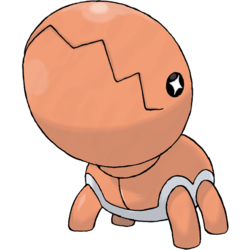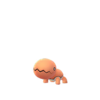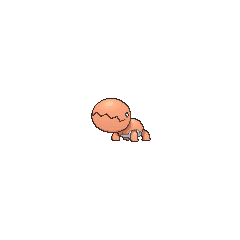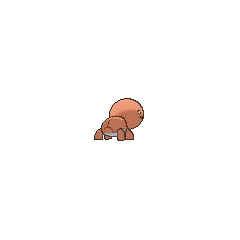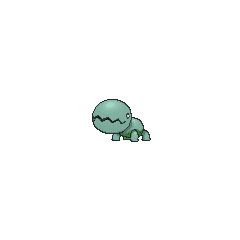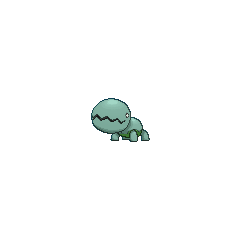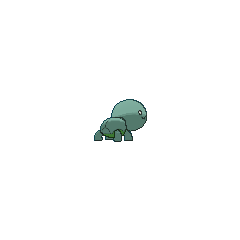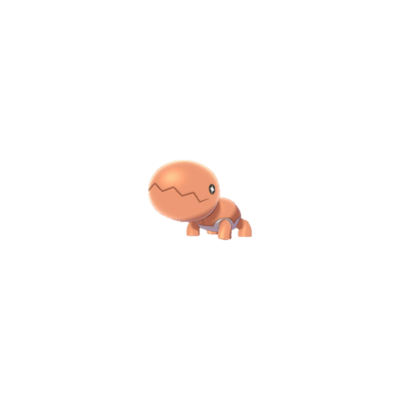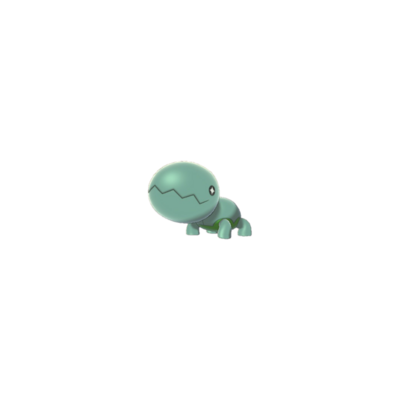Trapinch (Japanese: ナックラー Nuckrar) is a Ground-type Pokémon introduced in Generation III.
It evolves into Vibrava starting at level 35, which evolves into Flygon starting at level 45.
Biology
Trapinch is an orange, insectoid Pokémon. It has a round body with a white underside and four stumpy legs. It also has a proportionally large head, small black eyes with twinkle-shaped pupils, and a zigzagging mouth.
Trapinch's large jaws are powerful enough to crush boulders. It lives in arid deserts, and it can go a week without water. Instead of actively hunting prey, it digs into the sand to build its bowl- or cone-shaped nests, where it waits for prey to stumble inside and become trapped. The weight of this Pokémon's large head makes Trapinch move slower but becomes vulnerable after falling or rolling into their backs. Its natural predator is Sandile.
In the anime
Major appearances
Multiple Trapinch debuted in Beg, Burrow and Steal. They had dug a complex underground labyrinth containing a lake, which Hal wanted to find after he previously came across it when he was young. When Hal, Ash, his friends, Elisa, and Team Rocket got lost in the labyrinth, they eventually found the underground lake.
In Pokémon Ranger and the Kidnapped Riolu! (Part 2), Solana used her Capture Styler on a Trapinch and had it use Rock Tomb to trap J's client's henchmen's Pokémon that were attacking Dawn, Brock, and Officer Jenny's Pokémon.
In A Rivalry to Gible On!, a Trapinch living at Mt. Shady used its Arena Trap to capture Ash while he and Khoury were trying to catch a Gible.
In Making Battles in the Sand!, Goh caught a Trapinch while he was investigating a sandstorm in Mauville City. It has since made further appearances in Pokémon Journeys: The Series.
Minor appearances
A Coordinator's Trapinch appeared in Mean With Envy.
A Trapinch appeared in a visualization in Hi Ho Silver Wind!.
A Coordinator's Trapinch appeared in Deceit and Assist.
In Numero Uno Articuno, Noland's Trapinch was living at the Battle Factory.
A Coordinator's Trapinch appeared in The Saffron Con.
In All Dressed Up with Somewhere To Go!, a Trapinch was dressed up as a Turtwig.
A Trainer's Trapinch appeared in A Shocking Grocery Run!.
In Lillie's Egg-xhilarating Challenge!, a Trapinch was playing in Lillie's garden. It reappeared in The Ol' Raise and Switch!.
In Some Kind of Laziness!, a Trapinch ate an Oran Berry that slid into its pit in the middle of the Haina Desert.
In I Choose Paradise!, a Trainer's Trapinch was at the Pokémon Paradise Resort.
In Securing the Future!, five Trainers' Trapinch joined the rest of Alola in showering Necrozma with light so it could return to its true form.
In Don't Ignore the Small Stufful!, a Trapinch was staying at Aether Paradise.
In The Battlefield of Truth and Love!, a Trainer's Trapinch was at Manalo Stadium.
A Trainer's Trapinch appeared in JN070.
Pokédex entries
| Episode
|
Pokémon
|
Source
|
Entry
|
| AG106
|
Trapinch
|
Ash's Pokédex
|
Trapinch, the Ant Pit Pokémon. Trapinch dig cone-shaped holes in desert areas. Its large and powerful jaws are capable of crushing stone.
|
|
| Episode
|
Pokémon
|
Source
|
Entry
|
| JN036
|
Trapinch
|
Goh's Rotom Phone
|
Trapinch, the Ant Pit Pokémon. A Ground type. Trapinch's nest is at the bottom of a cone-shaped hole, where it patiently waits for something to fall in. It can break rocks apart with its huge jaws.
|
|
In the manga
Pokémon Adventures
A Trainer's Trapinch appeared in Bubble Bubble Toil and Azumarill I.
The Battle Factory rented a Trapinch, which was stolen by Guile Hideout in Facing Gulpin Is Hard to Swallow.
A Trapinch appeared in The Transfer Student, under the ownership of Hugh. It later evolved into Vibrava.
In The Final Battle: Crushed Ambition, a Trapinch liberated by Team Plasma was stuck in N's Castle.
In the TCG
- Main article: Trapinch (TCG)
Game data
Pokédex entries
| This Pokémon was unavailable prior to Generation III.
|
| Generation III
|
|
Hoenn
#116
|
|
Kanto
#—
|
| Ruby
|
Trapinch's nest is a sloped, bowl-like pit dug in sand. This Pokémon patiently waits for prey to tumble down the pit. Its giant jaws have enough strength to crush even boulders.
|
| Sapphire
|
Trapinch is a patient hunter. It digs an inescapable pit in a desert and waits for its prey to come tumbling down. This Pokémon can go a whole week without access to any water.
|
| Emerald
|
Its big jaws crunch through boulders. Because its head is so big, it has a hard time getting back upright if it tips over onto its back.
|
| FireRed
|
It lives in arid deserts. It makes a sloping pit trap in sand where it patiently awaits prey.
|
| LeafGreen
|
|
|
| Generation IV
|
|
Sinnoh
#—
|
|
Johto
#—
|
| Diamond
|
It makes a conical pit in desert sand and lies in wait at the bottom for prey to come tumbling down.
|
| Pearl
|
| Platinum
|
| HeartGold
|
Its nest is a sloped, bowl-like pit in the desert. Once something has fallen in, there is no escape.
|
| SoulSilver
|
|
|
| Generation V
|
|
|
Unova
B2W2: #121
|
| Black
|
It makes a conical pit in desert sand and lies in wait at the bottom for prey to come tumbling down.
|
| White
|
| Black 2
|
It makes an inescapable conical pit and lies in wait at the bottom for prey to come tumbling down.
|
| White 2
|
|
|
| Generation VI
|
|
Kalos
Mountain #003
|
|
Hoenn
#121
|
| X
|
It lives in arid deserts. It makes a sloping pit trap in sand where it patiently awaits prey.
|
| Y
|
It makes an inescapable conical pit and lies in wait at the bottom for prey to come tumbling down.
|
| Omega Ruby
|
Trapinch's nest is a sloped, bowl-like pit dug in sand. This Pokémon patiently waits for prey to tumble down the pit. Its giant jaws have enough strength to crush even boulders.
|
| Alpha Sapphire
|
Trapinch is a patient hunter. It digs an inescapable pit in a desert and waits for its prey to come tumbling down. This Pokémon can go a whole week without access to any water.
|
|
|
| Generation VII
|
|
Alola
SM: #235
|
|
Alola
USUM: #304
|
|
Kanto
#—
|
| This Pokémon has no Pokédex entries in Let's Go, Pikachu! and Let's Go, Eevee!.
|
| Sun
|
It can live for a week without eating a thing. It waits patiently at the bottom of its nest for prey to appear.
|
| Moon
|
As it digs through the sand, its giant jaws crush any rocks that obstruct its path. It builds a funnel-shaped nest.
|
| Ultra Sun
|
Its jaws are strong enough to crush rocks but so heavy that it can't get up if it flips over. Sandile seize those moments as their chance.
|
| Ultra Moon
|
It builds nests that double as traps, lying in wait for its prey to get caught. When night falls, it digs itself a spot beneath the sand to sleep.
|
|
|
| Generation VIII
|
|
|
Galar
#321
|
| Sword
|
Its nest is a sloped, bowl-like pit in the desert. Once something has fallen in, there is no escape.
|
| Shield
|
It makes an inescapable conical pit and lies in wait at the bottom for prey to come tumbling down.
|
|
|
Game locations
| This Pokémon was unavailable prior to Generation III.
|
|
|
|
|
|
|
|
|
|
|
|
|
In side games
| This Pokémon was unavailable prior to Generation III.
|
|
|
|
|
|
|
|
|
|
|
|
|
In events
Held items
Stats
Base stats
| Stat
|
Range
|
| At Lv. 50
|
At Lv. 100
|
45
|
|
105 - 152
|
200 - 294
|
100
|
|
94 - 167
|
184 - 328
|
45
|
|
45 - 106
|
85 - 207
|
45
|
|
45 - 106
|
85 - 207
|
45
|
|
45 - 106
|
85 - 207
|
10
|
|
13 - 68
|
22 - 130
|
Total: 290
|
Other Pokémon with this total
|
- Minimum stats are calculated with 0 EVs, IVs of 0, and (if applicable) a hindering nature.
- Maximum stats are calculated with 252 EVs, IVs of 31, and (if applicable) a helpful nature.
|
Pokéathlon stats
Type effectiveness
| Under normal battle conditions in Generation IX, this Pokémon is:
|
|
|
|
|
|
|
|
|
|
|
|
|
Learnset
|
|
|
|
- Bold indicates a move that gets STAB when used by Trapinch
- Italic indicates a move that gets STAB only when used by an Evolution of Trapinch
- Click on the generation numbers at the top to see level-up moves from other generations
|
|
|
|
|
- Bold indicates a move that gets STAB when used by Trapinch
- Italic indicates a move that gets STAB only when used by an Evolution of Trapinch
- Click on the generation numbers at the top to see TM moves from other generations
|
|
|
|
|
- Moves marked with an asterisk (*) must be chain bred onto Trapinch in Generation VIII
- Moves marked with a double dagger (‡) can only be bred from a Pokémon who learned the move in an earlier generation.
- Moves marked with a superscript game abbreviation can only be bred onto Trapinch in that game.
- Bold indicates a move that gets STAB when used by Trapinch
- Italic indicates a move that gets STAB only when used by an Evolution of Trapinch
- Click on the generation numbers at the top to see Egg moves from other generations
|
|
|
|
|
- Bold indicates a move that gets STAB when used by Trapinch
- Italic indicates a move that gets STAB only when used by an Evolution of Trapinch
- Click on the generation numbers at the top to see Move Tutor moves from other generations
|
By transfer from another generation
|
|
|
|
- Transferred Pokémon only retain these moves in Pokémon Sword and Shield
- A striped background indicates a generation in which the move can only be obtained via event or as a special move
- Bold indicates a move that gets STAB when used by Trapinch
- Italic indicates a move that gets STAB only when used by an Evolution of Trapinch
- × indicates a move that cannot be used in Sword and Shield
- Click on the generation numbers at the top to see transfer-only moves for other generations
|
TCG-only moves
Side game data
|
|
|
|
|
|
|
|
|
Pokémon Rumble Rush

|
Walking Speed: 1.55 seconds
|
Base HP: 46
|
|
| Base Attack: 70
|
Base Defense: 46
|
Base Speed: 40
|
|
|
|
|
|
|
|
New Pokémon Snap

|
| Photodex entry #126
|
| Those bowl-shaped holes you see in the desert are Trapinch nests. They’re very effective—both at protecting Trapinch and at funneling any food to it that falls in.
|
|
|
Evolution
Sprites
| This Pokémon was unavailable prior to Generation III.
|
|
|
|
|
|
|
|
|
|
|
|
|
Trivia
- Trapinch is the only one in its evolutionary family to have a Hidden Ability.
- Trapinch has the lowest base Speed stat of all Ground-type Pokémon.
- Trapinch's base Attack stat is higher than that of its evolved form and is the same as that of its final evolved form. That may be a reference to the fact that antlion larvae are more aggressive and predatory than their adult stages.
- It also has the highest base Attack stat of all Pokémon that can evolve twice.
- Evolving a Trapinch in Pokémon GO will result in the CP going down upon evolution.
- As of Generation VIII, Trapinch and its evolved forms are the only Pokémon that are in the Bug and Dragon Egg Groups.
Origin
Bulbanews has an article related to this subject:
Trapinch is based on the larval stage of the antlion, which live in conical sandy pits before maturing into winged adults.
Name origin
Trapinch is a combination of trap (describing traps it uses to catch prey) and pinch (referring to its powerful jaws).
Nuckrar may be a contraction of nutcracker, referencing its nutcracker-like jaws. Nuckrar may also be a play on the word "knucker", a type of folkloric dragon which lives in a hole.
In other languages
| Language
|
Title
|
Meaning
|
 Japanese Japanese
|
ナックラー Nuckrar
|
Contraction of nutcracker
|
 French French
|
Kraknoix
|
Corruption of craque-noix
|
 Spanish Spanish
|
Trapinch
|
Same as English name
|
 German German
|
Knacklion
|
From Knacken and antlion
|
 Italian Italian
|
Trapinch
|
Same as English name
|
 Korean Korean
|
톱치 Topchi
|
From 톱 top and 치 (齒) chi; literally "Saw tooth"
|
 Mandarin Chinese Mandarin Chinese
|
大顎蟻 / 大颚蚁 Dà'èyǐ
|
Literally "Big jaw ant"
|
 Cantonese Chinese Cantonese Chinese
|
|
|
|
|
|
| More languages
|
 Hindi Hindi
|
ट्रापिन्च Trapinch
|
Transliteration of English name
|
 Russian Russian
|
Трапинч Trapinch
|
Transliteration of English name
|
 Thai Thai
|
นัคครา Nakkhra
|
Transcription of Japanese name
|
|
|
|
External links

|
This Pokémon article is part of Project Pokédex, a Bulbapedia project that aims to write comprehensive articles on each Pokémon species, as well as Pokémon groups and forms.
|
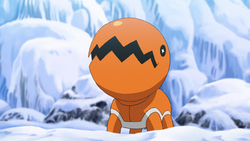
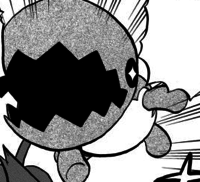
 For other sprites and images, please see Trapinch images on the Bulbagarden Archives.
For other sprites and images, please see Trapinch images on the Bulbagarden Archives.
